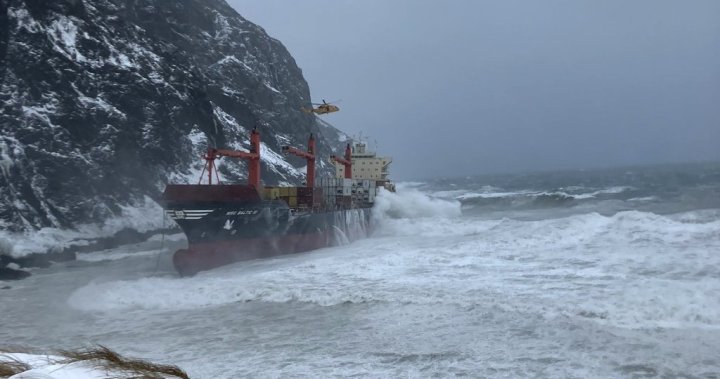Canada
Cargo ship crew rescued after running aground on Newfoundland coast

Incident Overview: A harrowing experience off Newfoundland’s coast
In the early hours of February 16, 2025, the MSC Baltic III, a cargo ship navigating the treacherous waters off Newfoundland’s western coast, encountered a critical malfunction. Losing power while near Lark Harbour, the vessel was unable to anchor due to unfavorable sea conditions, leading it to run aground. This incident unfolded not far from the entrance to the Bay of Islands, about 12 nautical miles offshore. The Canadian Coast Guard swiftly responded, ensuring the safe evacuation of all 20 crew members via a Cormorant helicopter. The cause of the power loss remains under investigation, leaving questions about the circumstances surrounding this event.
Mayday and Response: Heroes of the Storm
As the MSC Baltic III struggled, a mayday call was dispatched to the Marine Communications and Traffic Services in Port aux Basques. The response was immediate, with a Cormorant helicopter braving the harsh weather to execute a daring rescue. These helicopters, renowned for their robustness and agility, proved indispensable in plucking the crew to safety. The rescue team’s expertise and the aircraft’s capabilities were crucial in navigating the turbulent conditions, showcasing the critical role of Canada’s maritime emergency services. The crew’s relief and gratitude were palpable as they were airlifted to safety, a testament to the bravery and precision of the rescue operation.
Safety Measures: Fortifying Maritime Protocols
This incident highlights the stringent safety measures in place within Canada’s maritime sector. The country’s marine safety protocols are among the world’s most rigorous, often exceeding international standards. Regular drills, advanced technology, and thorough crew training are pillars of these protocols, designed to mitigate risks and ensure rapid response during emergencies. The safe evacuation of the MSC Baltic III’s crew underscores the effectiveness of these measures, which have been refined over years of addressing the unique challenges posed by Canada’s vast and often hostile coastlines.
Investigation: Unraveling the Mystery
The investigation into the MSC Baltic III’s power loss is ongoing, with authorities exploring all possible causes. This process, typically involving multiple agencies, will examine factors ranging from mechanical failure to environmental conditions. Similar past incidents have often revealed a combination of technical and operational factors. The findings will be crucial not only for determining liability but also for enhancing maritime safety by identifying areas for improvement and implementing preventive measures.
Environmental Concerns: Safeguarding Newfoundland’s Ecosystem
Despite the grounding, environmental damage appears minimal, thanks to the ship’s cargo and the prompt response. However, the incident serves as a stark reminder of the fragility of Newfoundland’s coastal ecosystem. The region’s rich marine biodiversity is vulnerable to oil spills and chemical contamination, necessitating stringent environmental protection protocols. Authorities are vigilantly monitoring the situation, employing measures to contain any potential leaks and prevent ecological disaster, reflecting a deep commitment to preserving the area’s natural heritage.
Conclusion: Lessons Learned and FuturePreparedness
The grounding of the MSC Baltic III, while alarming, ultimately became a story of successful crisis management and safety. It underscores the importance of preparedness, swift action, and robust safety protocols in maritime operations. As the investigation proceeds, the focus remains on learning from this event to enhance future safety and environmental protection. This incident serves as a poignant reminder of the unpredictability of maritime voyages and the invaluable role of dedicated emergency responders, inspiring continuous improvement in safeguarding lives and the environment at sea.











